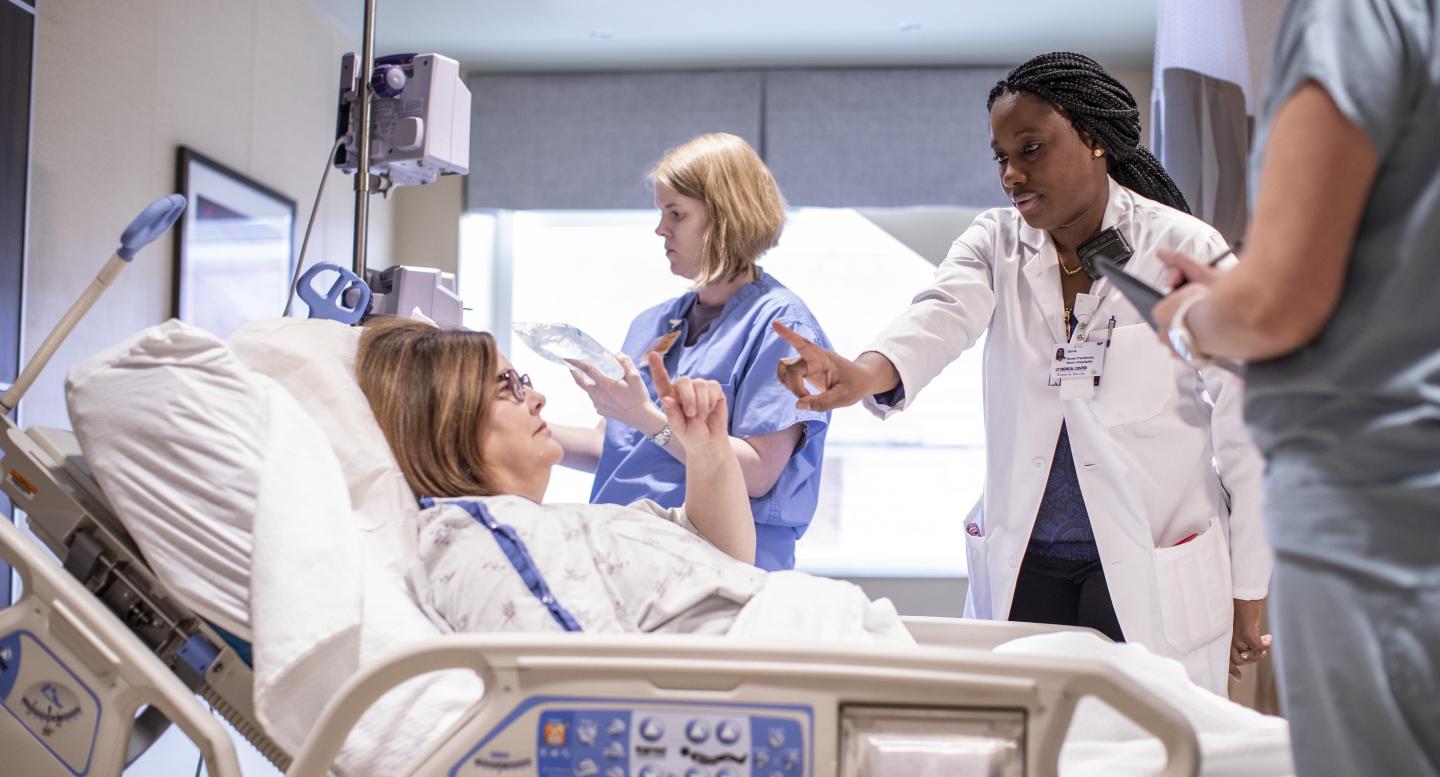Overview
A UT Medical Center, our Neurocritical Care team has more neurointensivists (medical doctors specializing in critically ill neurological/neurosurgical patients) than any other hospital in East Tennessee. Our state-of-the-art unit design provides the highest level of care for patients and their families.
Our Services
The neurocritical care unit treats a range of disorders, including:
- Stroke
- Brain Tumors
- Brain and Spinal Cord Injuries
- Nerve and Muscle Problems
- Brain Infections, such as encephalitis and meningitis
- Persistent Seizures
- Brain Swelling
Our Elite Neurocritical Care Team
Our multidisciplinary medical staff has extensive training in caring for patients with injuries and diseases of the brain and spine.
Neurointensivists
The team is led by neurointensivists. These are fellowship-trained medical doctors who manage critically ill neurological and neurosurgical patients. The medical center has more neurointensivists than any other hospital in East Tennessee. This creates an exceptional standard of care for our patients.
Advanced Practitioners
Each doctor is supported by a nurse practitioner, a physician assistant and a pharmacist. All of these advanced practitioners have obtained, at a minimum, a master’s degree, along with advanced training in neurological care.
Unit Staff
The neurocritical care unit is also staffed by a team of registered nurses (RNs). These RNs have extensive initial and ongoing cerebrovascular training.
In addition to the physicians, advanced practitioners, and RNs, we have a multidisciplinary team that ensures the very complex needs of these patients are met.
- A dedicated stroke team that responds to Code Stroke 24/7 to ensure rapid evaluation and treatment of patients
- Neurointerventional radiologists
- Neurologists
- Neurosurgeons
- Physical, occupational and speech therapists
A Demonstrated Track Record in Stroke Care
The medical center has a demonstrated track record of quality care for stroke patients:
- Certified as a stroke center by The Joint Commission since 2005
- Achieved the highest level of certification as an Advanced Comprehensive Stroke Center since March 2013
- One of fewer than 200 Comprehensive Stroke Centers certified by The Joint Commission in the United States
- The Joint Commission recognized our ongoing educational process as a best practice
- Recognized annually for quality and performance at the highest level by the American Stroke Association since 2011
- Our team consistently outperforms peer/comparison groups in a set of 20 Joint Commission quality and performance measures
Stroke Centers are recognized as industry leaders and are responsible for setting the national agenda in highly-specialized neurological care.
The care doesn’t end when a stroke patient is discharged from the hospital. Stroke Center nurse practitioners and physician assistants conduct follow-up assessments at seven days and 90 days for the most complex stroke patients discharged to home. To ensure continued opportunity for optimal recovery, a stroke follow-up clinic has been established at the medical center’s University Neurology.
State-of-the-Art Unit Design
A multidisciplinary team of doctors, nurses and facilities experts designed the Neurocritical Care Unit. They created it to meet the complex needs of our neurocritical patients and their families.
The unit, expanding to 24 beds, optimizes healing in our patients. In addition, it reduces stress in the families and staff. Thoughtful design gives the medical team unprecedented access to patients. This occurred by changing one, simple thing. Instead of putting the beds on the wall, our patients’ beds are pulled away from the wall. That way, staff members can move around them 360 degrees.
Cords do not clutter the floor. Instead, they run from a moveable boom system. This system hangs from the ceiling, and holds the computers and medical equipment needed to treat each patient.
Every room has a patient lift. This saves patients from injury and lowers the amount of physical stress on caregivers. Windows in the patient rooms have built-in shades to maintain patient privacy. But they also create a beautiful, relaxing environment, shown by the latest studies to promote healing and well-being.
In the center of the unit, there is a a meeting area with a large monitor. This allows the medical team to work together on patient cases. In addition, it keeps them close to the patients, families and other team members. There is also a portable X-ray machine with a processing station to give all team members fast access to X-rays.
Providing the Best Possible Care for Patients
Other amenities promote the health and well-being of the staff. This helps them provide the best care possible for patients and their families.
These include:
- Individual work areas, where they can focus on their work
- Centrally located rooms for supplies, food and medicine. There is a room at both ends of the unit to make it quick and easy to locate these resources for our patients
- A quiet room where team members can meditate and relax
- An area for breastfeeding mothers to pump privately
Our elite team of neurocritical caregivers leads the nation in neurocritical care.


